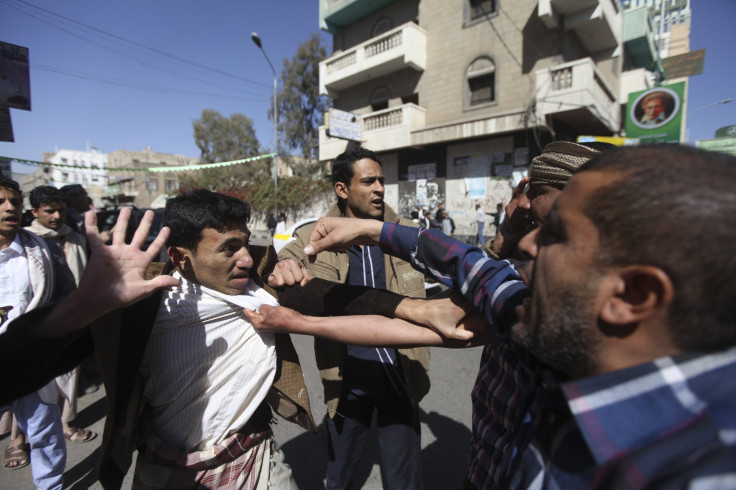Houthis, Yemen's Ascendant Group, Promise Stability And Victory Against Al Qaeda

Yemen currently has no government and two groups from opposing religious sects vying for control, one of which is al Qaeda’s strongest branch. It is the poorest country in the Middle East, and roughly half of its population is below the poverty line. Almost 50 percent of Yemenis don’t have access to clean water, and slightly less than a third don’t have basic health care. And after a self-described "coup" led by a Shiite minority faction, the Houthis, Yemen also risks becoming a foreign policy failure for the U.S. and Saudi Arabia, which could see their role in the country curtailed in favor of Iran, the Houthis' political patron.
The Houthis are describing themselves as the only group able to improve quality of life for the average Yemeni, beset with near-constant political violence. Nearly a week after they forced President Abed Rabbo Mansour Hadi to step down, Sanaa is “really calm. It seems we’re better off with no government or president,” said Hussain al-Bukhaiti, a translator and journalist who described himself as the unofficial spokesman for the Houthis until they form an official political party.
It's still difficult to gauge how much progress the Houthis have made in improving the situation, since they are not in control of the entire country and Yemen does not keep detailed statistics. But crime dropped 59 percent last year in the capital Sanaa, where the Houthis have been in control since September, the city's police chief told pro-rebel news website al-Thawra.
This year, the Houthis have been involved in a fierce campaign to drive out al Qaeda militants from their stronghold in the south. They’ve succeeded with unprecedented speed. Almost immediately after the group seized the capital in September, it battled al Qaeda militants in al-Bayda province, including Radaa city, according to Al-Jazeera.
In the short term, some Yemenis view the Houthis' success against militants as a liberation. But that same success could cause larger problems for the country later. "The Houthis' sectarian nature has enabled al Qaeda to portray its conflict against them as Shia targeting Sunnis," Saeed Obeid, a Yemeni analyst, told Al-Jazeera last month.
Any perception that the Houthis might be de facto American allies in the fight against al Qaeda is dispelled by their slogan, which is “God is the Greatest. Death to America. Death to Israel. Damn the Jew and Victory to Islam.” They have in fact been saying that Yemen’s current dismal state is the result of the U.S. and neighboring Saudi Arabia trying to control the country for their own interests, al-Bukhaiti said while praising Iran.
“The Iranians, when they have relations with you, they try to make your country stand out. Saudis are different,” he said, speaking via Skype. “They want us always to be dependent on them for everything. That’s the difference about when we will have relationships with Iran and not Saudi Arabia.”
Many among the Houthis and their supporters chalk up that rating to the decision by longtime President Ali Abdallah Saleh, ousted in an Arab Spring revolution in 2011, to align the country with the U.S. and Saudi Arabia. Reports of a Iran-Houthi alliance began to surface during that revolution, when the Houthis participated in overthrowing the president. Since then there have been several reports that Iran has funded, trained and supplied weapons to the rebel group -- as it has done in Syria with Bashar Assad’s regime, in Lebanon with Hezbollah, and in Iraq with its Shiite militias. Iran and the Houthis claim they have no direct involvement, but neither is concealing their willingness to work together.
"It’s normal to want to be surrounded by people who have the same enemy,” al-Bukhaiti said, in reference to the web of Shiite alliances Iran is weaving.
In response, Saudi Arabia may begin funding Sunni communities in “various fragile states like Syria, Yemen, Iraq to oppose Iranian advances,” said Karen Elliott House, the author of “On Saudi Arabia: Its People, Past, Religion, Fault Lines -- and Future.”
The U.S. has been leading a counterterrorism campaign in Yemen since 2006, including funding and training of Yemeni armed forces as well as drone strikes on al Qaeda in the Arabian Peninsula, the militant group’s Yemen-based branch. Despite the U.S. campaign, AQAP has actually upped its social media recruitment campaign and touted itself as the the only viable option for jihadi hopefuls.
On Sunday, President Barack Obama said the current U.S. strategy in Yemen “is the best option we have." Despite Hadi’s resignation, “counterterrorism operations continue in Yemen,” Department of Defense spokeswoman Cmdr. Elissa Smith told International Business Times -- but with the Houthis in power, it is unclear for how long.
But according to the Houthis, they can defeat al Qaeda without any American involvement. “I am almost certain Yemen will be the first country to get al Qaeda out without any international help,” al-Bukhaiti said. “It will be an example for other countries in the region.”
© Copyright IBTimes 2024. All rights reserved.












